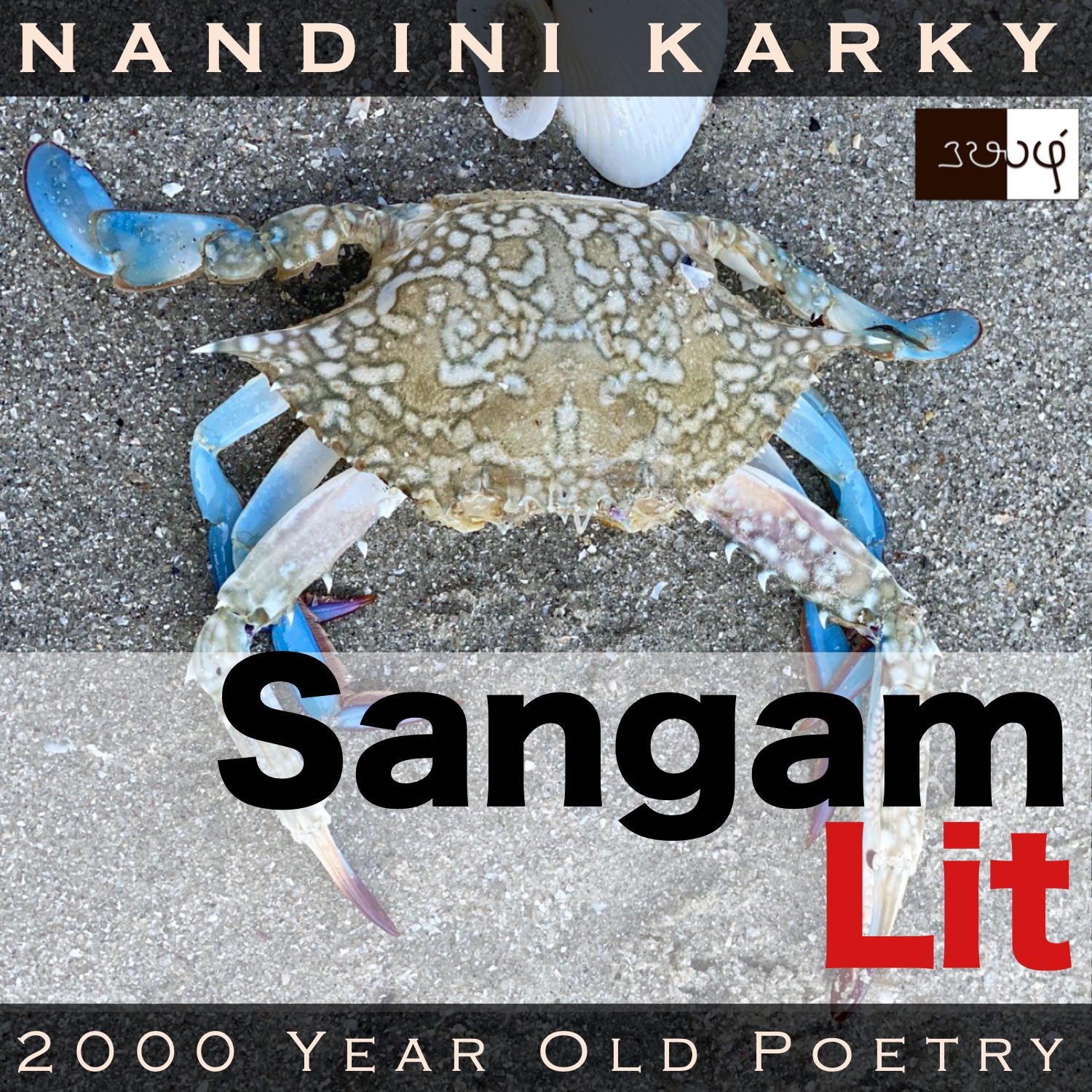Podcast: Play in new window | Download
Subscribe: Apple Podcasts | Spotify | Amazon Music | Android | iHeartRadio | TuneIn | RSS | More

In this episode, we travel to a seashore grove and learn about the pangs of love, as portrayed in Sangam Literary work, Natrinai 267, penned by Kabilar. The verse is set in the coastal regions of ‘Neythal’ and speaks in the voice of the confidante to the lady, passing on a subtle message to the man, listening nearby.
‘நொச்சி மா அரும்பு அன்ன கண்ண
எக்கர் ஞெண்டின் இருங் கிளைத் தொழுதி,
இலங்கு எயிற்று ஏஎர் இன் நகை மகளிர்
உணங்கு தினை துழவும் கை போல், ஞாழல்
மணம் கமழ் நறு வீ வரிக்கும் துறைவன்-
தன்னொடு புணர்த்த இன் அமர் கானல்,
தனியே வருதல் நனி புலம்பு உடைத்து’ என,
வாரேன்மன் யான், வந்தனென் தெய்ய;
சிறு நா ஒண் மணித் தெள் இசை கடுப்ப,
இன மீன் ஆர்கை ஈண்டு புள் ஒலிக்குரல்,
‘இவை மகன்’ என்னா அளவை,
வய மான் தோன்றல் வந்து நின்றனனே.
The verse opens with the image of a ‘நொச்சி மா அரும்பு’ meaning ‘black buds of the chaste tree’. From our knowledge of Sangam poems, we can say that if a denizen of the floral kingdom is presented, then most probably, a member of the fauna will shortly appear. Our predictions come true in ’எக்கர் ஞெண்டு’ or ‘sand dune crabs’. Note how this ancient word ‘ஞெண்டு’ has transformed into the modern day word for the crustacean, ‘நண்டு’. The sketch of smiling maidens delights us in ‘இன் நகை மகளிர்’. The phrase ‘துழவும் கை போல்’ is a snapshot of ‘a hand that stirs through something’. When we see the words, ‘இவை மகன்’ என்னா அளவை’ meaning ‘The moment I thought it’s him’, it makes our intrigue soar, as does the finishing words ‘வந்து நின்றனனே’ meaning ‘He came and stood’. Enough fodder for us to take a longer walk on this shore!
The man and lady had been leading a love relationship and had been trysting together in the seaside grove by day. When apart from the man, the lady’s health suffered and seeing the changes in her, her parents have confined her to the house. One day, when the man arrives near the lady’s house, the confidante, pretending not to notice him, but making sure he’s in earshot, turns to the lady and says, “With eyes akin to black buds of the ‘gnochi’, a huge cast of crabs on the sand dunes, claw through fragrant, fallen flowers of the ‘gnazhal’, looking like hands of smiling maidens with shining teeth, as they stir drying millets. Such is the domain of the lord of the shore! Thinking to myself ‘this is the pleasant grove in which the man and lady trysted and, if I were to walk alone there, it would cause me immense pain’ I had avoided visiting the place. One day, I happened to go there. Hearing rich voices of a flock of birds hunting a school of fish, which sounds like short-tongued clear bells, I mistakenly decided ‘It’s the lord’ and just that moment, with his strong horses, he came and stood there!” With these words, the confidante conveys to the man that the lady is suffering owing to slanderous talks in the town and subtly hints that he should relieve the lady’s angst by seeking her hand in marriage.
Now, let’s take a dive to see what lies beneath these words! The confidante opens with a description of the man’s land, which is a seashore, on which rows of crabs are seen clawing on the fallen flowers of the ‘gnazal’ or ‘senna sophera’. Two similes are brought in, to add poetic beauty to this scene. One, the prominent black buds of the chaste tree are called in to stand for the protruding eyes of these crabs and two, the motion of a smiling Sangam woman’s hands, as she stirs the millets laid out to dry, is compared to the clawing of the flowers by the crabs on those sand dunes. A detailed description indeed! Could it be merely to describe the man’s domain? Let’s explore that in a moment!
From the scenes outside, the confidante turns to illustrate something on her mind. She reveals her thought process saying that she has been avoiding going to the grove knowing how being there alone without the lady would pain her. She would be pained because this is the place where the lady and man had trysted together, hinting that this happy union can no longer take place as the lady has been confined to the house.
Like how we find ourselves suddenly in the middle of something we have been refusing to face, the confidante, too, finds herself in the very grove she’s been thus avoiding. Suddenly, she hears the sound of bells in the air. She thinks to herself, ‘the man is here!’. Then, she looks up and understands that the sound did not come from the man’s chariot but from the call of seabirds flying in a fish-feeding frenzy. As she was preparing to move away, as if by magic, the man himself appeared there, leading his strong horses, the confidante concludes.
Returning to the metaphor of crabs clawing through the fallen flowers, the confidante conveys to the man that the rumours of the townsfolk about the lady’s relationship with the man is causing further hurt in the lady, who has fallen like those ‘gnazal’ flowers into confinement. When she relates about how the man seemed to appear the moment she thought of him, the confidante hopes that the man will similarly understand the love and angst in the lady’s mind and appear with precious offerings to the lady’s kith and kin so as to claim her hand in marriage. By remembering a scene that transpired and relating a metaphor, the confidante skilfully fills the lady with hope and at the same time, gently directs the man to pursue the path of permanent happiness.




Share your thoughts...